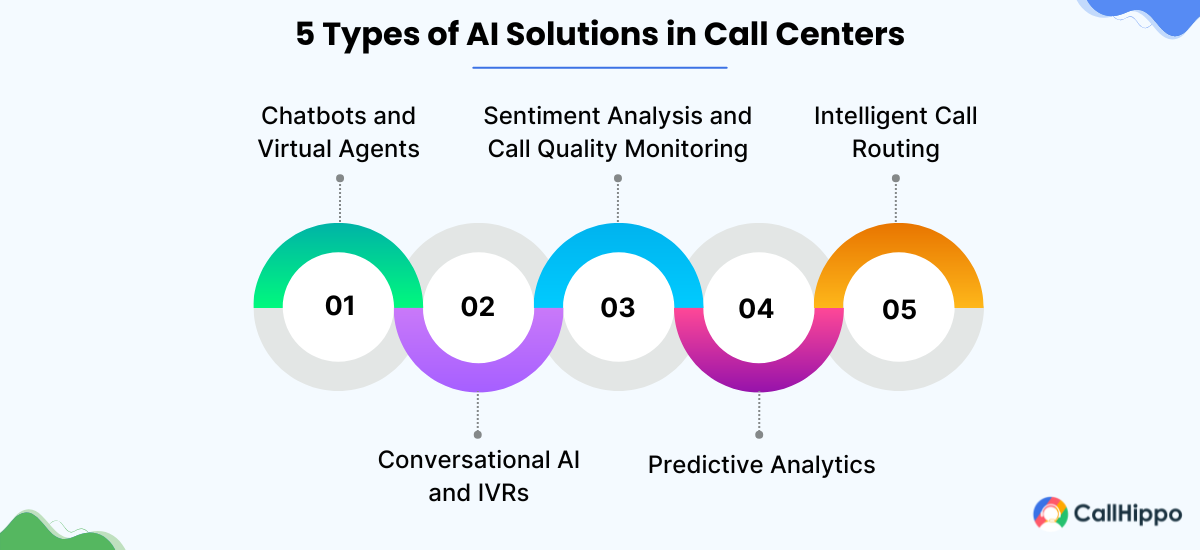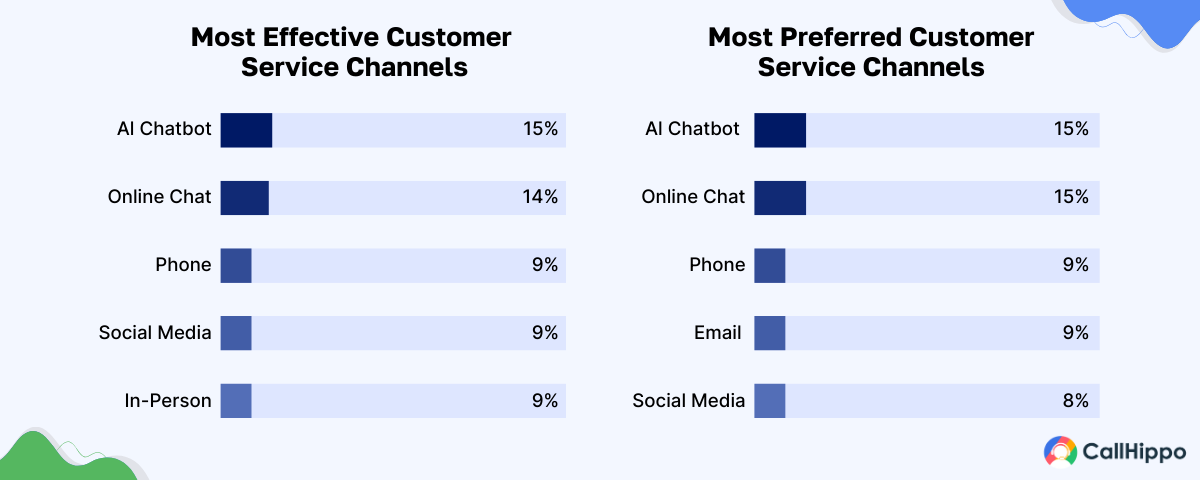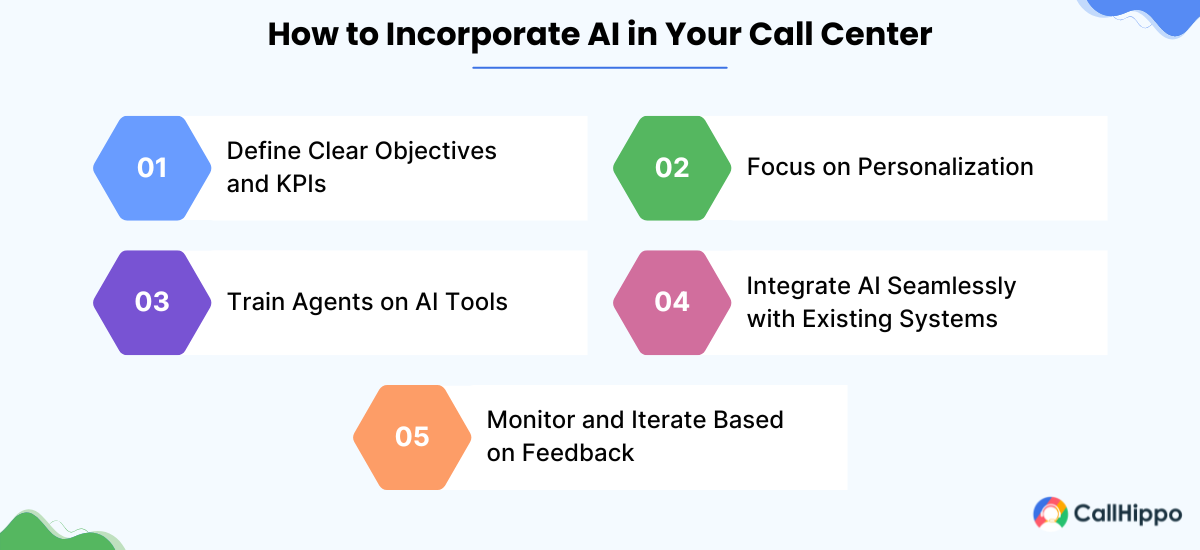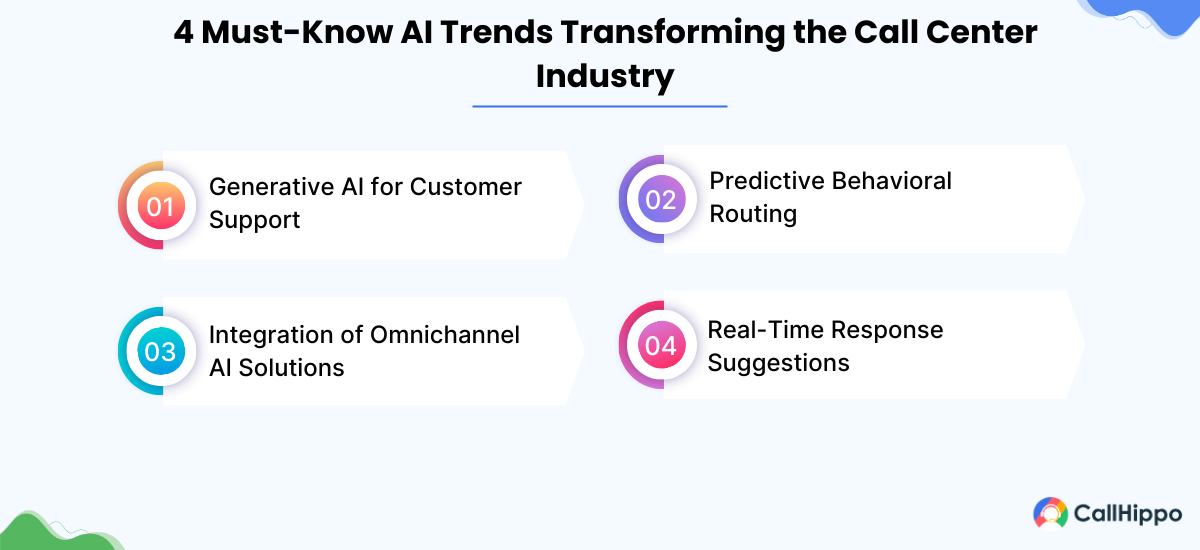Call centers are rapidly adopting AI tools to transform their customer service capabilities. Research shows that 80% of customer service organizations will implement generative AI by 2025 to enhance agent productivity and customer experience. From intelligent routing to real-time agent assistance, AI is reshaping how call centers handle inquiries, streamline workflows, and deliver personalized support.
Let’s understand the role of AI in call center operations, its different types, and best practices for using it.
What is Artificial Intelligence in Call Center?
AI in call centers refers to the use of artificial intelligence technologies to automate, enhance, and optimize customer service operations. It includes machine learning algorithms, natural language processing, and predictive analytics that help improve both customer experience and operational efficiency.
Artificial intelligence call center technology serves as both an assistant to human agents and a direct interface for customer interactions. It can handle routine inquiries independently, provide real-time support to agents during complex conversations, analyze customer sentiment, predict service issues, and optimize workforce management.
Leverage AI in call centers to streamline processes, enhance customer experiences, and boost agent productivity. Focus on clear goals, seamless integration, and continuous optimization based on performance insights.
Types of AI Solutions in Call Center
The primary types of call center AI solutions include chatbots and virtual agents, conversational AI and IVRs, sentiment analysis tools, predictive analytics systems, and intelligent call routing platforms. Let’s understand these in detail.

1. Chatbots and Virtual Agents
Modern AI solutions like CallHippo’s AI Voicebot are transforming how businesses handle customer interactions. These advanced virtual agents act as AI-powered sales representatives, working 24/7 to engage leads, qualify prospects, and close deals automatically.
For example, CallHippo’s AI Sales Agent for call centers can boost revenue by through optimized interactions and personalized pitches. The system also offers multilingual capabilities and cross-channel engagement, making it ideal for businesses looking to scale their outbound efforts efficiently.
2. Conversational AI and IVRs
Modern interactive voice response (IVR) systems powered by conversational AI have evolved far beyond basic menu trees. These sophisticated systems understand natural speech patterns, interpret customer intent, and engage in human-like dialogue.
They can process multiple languages, remember context from previous interactions, and adapt their responses based on customer history, making phone support more efficient and less frustrating for customers.
3. Sentiment Analysis and Call Quality Monitoring
AI-based call center systems continuously monitor customer interactions across voice and text channels, analyzing tone, emotion, and keywords in real-time.
Good contact center AI software helps supervisors identify challenging conversations, flag compliance issues, and provide timely coaching to agents. They also automatically score calls based on predetermined quality parameters, enabling more objective performance evaluation and targeted training opportunities.
4. Predictive Analytics
Predictive analytics leverages historical data to forecast call volumes, identify trending issues and anticipate customer needs. This technology helps call centers optimize staffing levels, prepare for seasonal spikes, and proactively address potential service issues before they escalate.
It also provides valuable insights into customer behavior patterns, enabling more personalized service strategies and improved first-call resolution rates.
5. Intelligent Call Routing
Smart routing systems use AI algorithms to match customers with the most suitable agents based on multiple factors, including customer history, issue complexity, agent skills, and current workload. This intelligent matching ensures that calls are handled by agents best equipped to resolve specific issues, improving resolution times and customer satisfaction.
The system continuously learns from successful interactions to refine its routing decisions and optimize call center performance.
CallHippo AI
- AI-Powered Call Transcription
- Smart Call Routing
- Seamless CRM Integration

How Artificial Intelligence Makes Call Centers Better?
AI technology is bringing measurable improvements to customer service centers through targeted automation and intelligent assistance. The AI chatbot is, in fact, the most preferred customer service channel, followed by online chat and phone support.

1. Improved Agent Productivity
Artificial intelligence in call centers empowers agents with real-time assistance and automated task handling. Research shows that contact centers using AI-powered tools report a 94% boost in agent productivity, with call center agents saving an average of 2 hours and 20 minutes daily through automated support.
2. Data-Driven Insights
AI in contact center solutions analyzes customer interactions, call patterns, and service trends to help managers make informed decisions. These insights enable contact centers to predict busy periods, identify common customer issues, and optimize staffing levels for better service delivery.
3. Enhanced Customer Experience
4. Cost Optimization
Smart automation and efficient resource allocation through call center AI solutions help reduce operational expenses. Companies report an average of $4.3 million in staffing cost savings when implementing AI tools while maintaining or improving service quality.
5. Scalability
AI empowers call centers to handle increasing customer demands without proportional staffing increases. With intelligent routing and automated responses to routine queries, contact centers can manage more simultaneous customer interactions without compromising service quality.
5 Best Practices for Implementing Artificial Intelligence in Call Center
While AI technologies will never completely replace humans in customer service and call center operations, as they are expected to take on more boring tasks. Here are 5 best practices for setting up AI in call centers.

1. Define Clear Objectives and KPIs
Set precise targets, such as reducing call volume, improving first-call resolution rates, or enhancing customer satisfaction scores. Prioritize essential metrics and Key Performance Indicators (KPIs) that correspond with your company’s objectives to measure the effectiveness of AI implementation.
2. Focus on Personalization and Customer Journey Mapping
Map out your entire customer journey and identify points where AI can enhance personalization. Configure your call center software to leverage customer data, including purchase history, previous interactions, and preferences, to provide contextual support.
Ensure your virtual agents can recognize returning customers and maintain conversation context across different channels.
3. Train Agents on AI Tools
Develop a comprehensive training program that helps agents understand how to work alongside AI. Focus on teaching customer service agents when to rely on AI suggestions and when to take manual control.
Additionally, includes practical sessions on using AI for real-time assistance, handling AI-to-human handoffs, and managing complex cases that require both human expertise and AI support.
4. Integrate AI Seamlessly with Existing Systems
Ensure your AI solution works harmoniously with your existing tech stack, including CRM, ticketing systems, and knowledge bases. Plan for data flow between systems to maintain consistent customer information. Implement proper security measures and create fallback procedures for when integrations face issues.
5. Monitor and Iterate Based on Feedback
Establish a continuous feedback loop that includes both customer and agent experiences with AI tools. Regularly review AI performance metrics, conversation transcripts, and user satisfaction scores.
Use these insights to fine-tune AI responses, adjust automation rules, and optimize the balance between automated and human support.
AI in Call Center: Trends to Watch
The future of AI in call centers extends far beyond basic automation, with technologies that enhance rather than replace human agents. From generative AI supporting more efficient customer interactions to predictive routing that optimizes customer-agent matching, these innovations are reshaping how organizations deliver exceptional customer service.

1. Generative AI for Customer Support
The integration of generative AI is reshaping how call centers handle customer inquiries. These systems can now draft contextually appropriate responses, summarize complex conversations, and even predict customer needs before they’re expressed. And there are no signs of slowing down.
2. Predictive Behavioral Routing
Moving beyond traditional skill-based routing, predictive behavioral routing uses AI to match customers with the most suitable agents based on personality, communication style, and historical success patterns.
This intelligent matching considers factors such as customer sentiment, issue complexity, and agent expertise. The technology analyzes patterns in successful interactions to optimize customer-agent pairings, leading to improved resolution rates and customer satisfaction.
3. Integration of Omnichannel AI Solutions
With 70% of customers expecting anyone they interact with to have the full context of their situation, omnichannel AI integration has become crucial. Modern AI systems maintain consistent customer context across voice, email, chat, and social media channels.
This ensures that customers don’t have to repeat information, regardless of their chosen communication channel. The focus is on creating a unified customer experience where context and history are preserved across all touchpoints.
4. Real-Time Response Suggestions
AI-powered real-time response systems support agents during live customer interactions by providing contextually relevant suggestions. These systems analyze customer sentiment, conversation context, and historical data to suggest optimal responses and the next best actions.
It helps maintain consistency in responses across large agent teams while allowing agents to focus more on building customer relationships rather than searching for information.
Conclusion
AI integration in contact centers has transformed customer service by combining intelligent automation with human expertise. While AI streamlines operations and enhances efficiency, the most successful implementations leverage technology to amplify human agents’ empathy and decision-making abilities, creating seamless experiences that blend the best of both worlds.
As these technologies continue to evolve, organizations that strategically adopt and integrate AI-driven solutions will be better positioned to meet rising customer expectations.
FAQs
1. How is AI used in customer service?
AI enhances customer service through automated responses, sentiment analysis, real-time agent assistance, and predictive routing. It handles routine queries, provides instant support, analyzes customer interactions for insights, and helps agents make better decisions through smart suggestions.
2. Will AI take over call centers?
AI complements rather than replaces human agents by handling routine tasks and providing support tools. However, complex issues, emotional situations, and strategic decisions still require human empathy and judgment. Thus, the future lies in human-AI collaboration rather than complete automation.
3. What are the risks of AI in customer service?
Key risks include over automation, which can lead to customer frustration, potential privacy concerns regarding data collection, accuracy issues in AI responses, and integration challenges with existing systems. Organizations must balance automation with a human touch and ensure robust data protection measures.

Subscribe to our newsletter & never miss our latest news and promotions.









